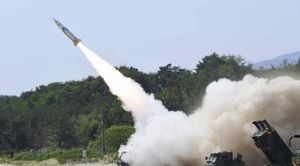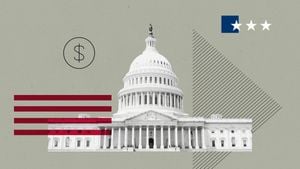There's fresh buzz surrounding the incoming Trump administration as it considers a controversial proposal known informally as the "Warrior Board." Reports indicate this board could play a significant role in deciding the fates of America’s top military generals. According to drafts reviewed by The Wall Street Journal, the idea is to set up this board to review the performance of high-ranking officers and potentially recommend dismissals.
This concept of assessing military leaders has sparked intense discussions. Indeed, when Donald Trump assumed office as President, he made it clear he would not shy away from scrutiny of military leadership. With hints dropped during the presidential campaign, Trump openly discussed his desire to remove generals who endorsed diversity initiatives and those he believed were involved in the chaotic withdrawal from Afghanistan. Such sentiments raise concerns among critics, who argue this approach could be threatening the nonpartisan nature of the military.
Retired Major General John Altenburg, who once served as deputy judge advocate general of the U.S. Army, shared his insights. He believes the Warrior Board could be within legal bounds, as military officers typically serve at the discretion of the President. "We see people all the time, you know, are relieved of command because their superiors lost confidence in their ability," said Altenburg, emphasizing the legality of such maneuvers. But he also posed the ethical predicament: just because something is legal doesn’t mean it’s necessarily wise.
The concerns about politicizing military leadership are not taken lightly. Altenburg added, "The policy issue is, 'Do we think it's a good idea to do it?'" His caution highlights a notable divide—while some might view this move as necessary oversight, others see it as the beginning of political machinations within military ranks.
Adding fuel to the fire, Pentagon officials have expressed apprehension over the implementation of such measures. Earlier statements from U.S. Department of Defense deputy spokesperson Sabrina Singh warned against the strain this could place on military operations. Singh stated, "Removing holding officers from moving up or not having people in place and […] maybe they're doing two jobs, maybe they're doing three jobs—yes, that's going to have an impact on operations, that's going to have an impact on morale and […] the department." This acknowledgment points to broader potential consequences, signaling how pivotal these positions are to the operational capability of the military.
With such weighty implications, the political discourse surrounding the proposal is already heating up. Trump's chosen nominee for Secretary of Defense, Pete Hegseth, has also been vocal in his critiques of the Pentagon and what he deems the "woke" military leadership. Observers are questioning how these comments, alongside the Warrior Board proposal, will be received during Hegseth’s Senate confirmation hearings. Proponents of the board may argue for the necessity of such interventions, but opponents warn it could significantly disrupt military cohesion.
During the campaign, Trump made headlines with promises to clean house among military ranks, stressing the need for loyalty and alignment with his administration’s vision. The mention of the Warrior Board fits neatly within this pattern of rhetoric. Critics worry this focus on alignment rather than merit could damage morale among military personnel who have served honorably across different administrations.
Despite these apprehensions, the prospect of the Warrior Board seems increasingly tangible. Some speculate about its potential impact. Would this new oversight board truly hold leaders accountable, or would it serve to stifle dissenting voices, pushing out those who might question the administration's decisions? It’s a delicate balance, and one not easily defined.
Indeed, the dialogue surrounding the Warrior Board evokes questions about the role of politics within military ranks. While accountability is undeniably important, proponents of nonpartisan military values argue fiercely for the need to keep politics out of military judgments.
Somber discussions of the practicalities aside, the ramifications of such moves are manifold. The military's ability to operate effectively hinges on stability and confidence within its leadership. Military veterans, policymakers, and active-duty personnel are wary about the path this country may take under such measures. Will the Warrior Board become what some fear, or can it transform military leadership for the good? Whatever the outcome, one thing is certain: the discussions surrounding the Trump administration's plans are far from over.



